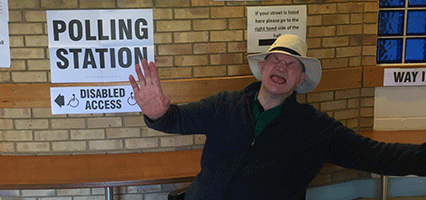Supporting someone to vote
With the right support, everybody with a learning disability can vote – so long as they can communicate who they want to vote for so someone complete the ballot paper on their behalf.
Prepare
The people you support need to decide why they want to vote – why is it important to them and what issues do they want to see the government tackle.
They also need to decide who they want to vote for. Research is important so they can fully understand the options available, and make an informed decision.
The main parties will hopefully publish Easy Read manifestos. You can see if they have these available to download on their website, or find out how to contact them and request they produce one.
- Visit the Conservative Party’s website
- Visit the Green Party’s website
- Visit the Labour Party’s website
- Visit the Liberal Democrats Party’s website
- Visit the Plaid Cymru Party’s website
When you have the information, discuss it with the person you support. Make sure you stay impartial (regardless of your political views) and offer the points for and against each party in a structured way.
Our voting passport will help you show polling station staff the support you need.
Support planning
Planning voting on the day into support plans will make the process smoother.
If a Support Worker has a particular interest or knowledge around politics and voting, plan to get them on shifts so they can talk to people they support in a non-partisan and impartial manner about voting.

Often support workers on a rota get into weekly/daily routines and support more than one person, so research where the nearest polling station is, opening times and the practicalities of how people you support can be supported there on election day – for example which bus to catch or who is driving.
Can someone be available to transport people specifically to vote throughout the day in your area?
Create a ‘buzz’
“As a support worker, I try to make the experience as enjoyable as possible.
“We go ‘off to the polls’ and then maybe a trip to the local café for breakfast or coffee. It’s important to talk to polling station officials and explain if a person needs your support in the booth.”- Paul, a Support Worker in Wales.
Share your stories and inspire others
If the person you support is happy to, they can share their stories and photos on social media (make sure you have consent from the person you are supporting).
You are not allowed to take photos inside the polling station, but you can take one outside. If you are taking a photo with the ballot card, make sure no personal details are visible.
Read how people we support have voted.
Remember to include #LoveYourVote or tag @DimensionsUK so we can see all your great stories.
Sharing our stories can encourage other people to vote.
The more people with learning disabilities that vote, along with their families and friends, increases the voice of this community, means the issues and concerns are given a higher priority among politicians.










